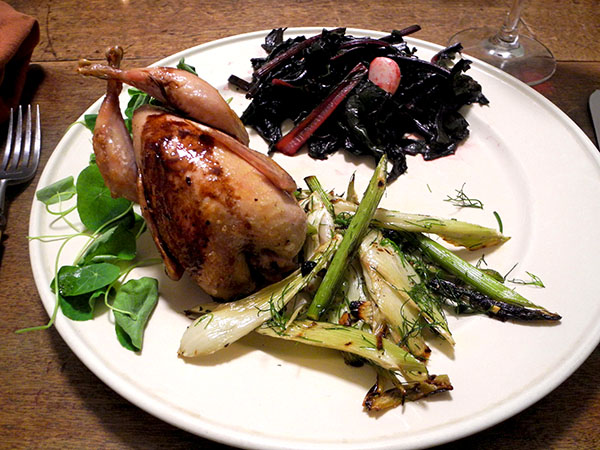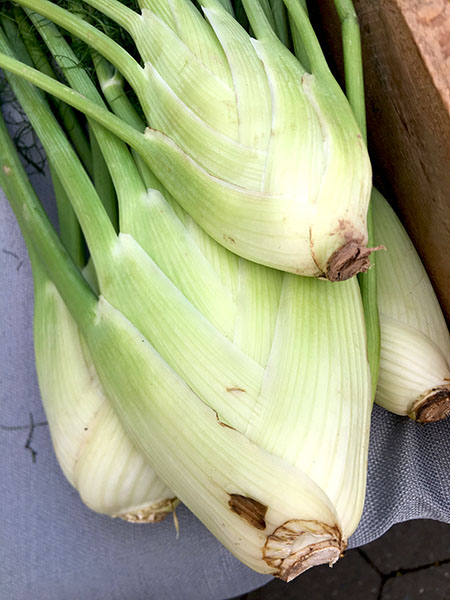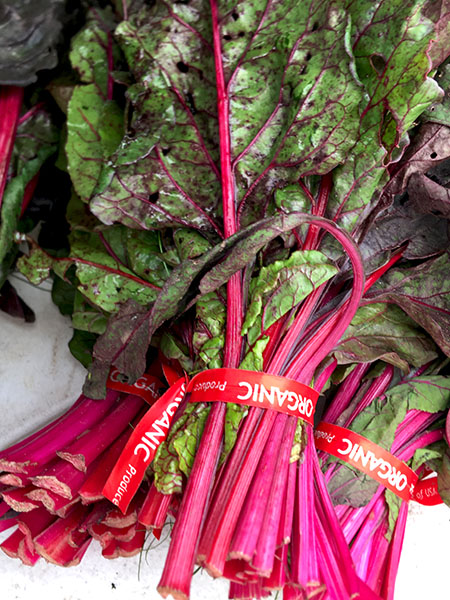
They were the largest and plumpest quail we have ever enjoyed. They turned out to be the tastiest as well, so we didn’t complain about the usual delicate carving operation required with tiny whole birds.
I could have flattened and pan-grilled them of course, saving some labor at the table and also avoiding a hot oven on a warm summer evening, but I was looking forward to seeing the little roasts arranged on the plates, and by using the air conditioning in the ‘breakfast room’, we were able to keep the dining table area cool.
We normally share 4 smaller quail between us for a main course, but these two approximated the weight of 4 of those raised in Georgia, so last night a single bird was enough for one serving.
The recipe had to be right, so I went looking for something suitable for roasting what I expected would be a special bird. I found this one on Simply Recipes, and, except for a few adjustments, I pretty much ran with it.
- after turning on the oven, and while waiting for it to heat to 400°F, two whole unboned (8+ ounce) pasture-raised certified organic quail from Abra Morawiec’s Feisty Acres Farm in Jamesport, Long Island, were washed and dried inside and out before each cavity was stuffed with a quarter of an organic lemon from Whole Foods Market and half of the following mix: 4 garlic cloves from Norwich Meadows Farm, peeled and bruised a little, the leaves of 2 sprigs of fresh thyme sprigs from Stokes Farm, the leaves of one sprig of fresh rosemary from Keith’s Farm, and one and a half tablespoons of Sicilian olive oil from Whole Foods Market, the quail then rubbed with olive oil and sea salt, trussed with string (holding legs together and wings against the breasts), the birds set aside and allowed to come to room temperature (allowing at least 20 minutes from the refrigerator), at which time they were quickly browned on all sides inside a small heavy enameled cast iron oval pan and, using sections of fennel stems to keep the birds breast-upright while they roasted (or celery stalks, or whatever suitable vegetable might be available), for about 20 minutes, but most importantly, until an instant-read thermometer registered 150º (the meat should also feel slightly firm, and the juices run pale pink when the bird is punctured with a skewer), adding half way through almost half a cup of white wine, Miriam Alexandra Chenin Blanc California 2016 (a very good chicken stock would be an alternative), the birds removed from the pan when done and set aside on a wooden plank or warm plate to rest for about 10 minutes, loosely tented with foil, while the sauce was assembled, beginning with discarding the fennel stems and placing the roasting pan on a burner above medium heat, adding a little chicken stock or wine (I used a sherry, Lustau, ‘Papirusa’ Light Manzanilla Sherry, from Sherry Lehmann), deglazing the pan by scraping any browned bits off the bottom, bringing the liquid to a simmer, pouring it into a small pot or sauté pan with about half a cup of a (hopefully inexpensive) balsamic vinegar, increasing the heat to high and boiling the liquid down to a syrup, or until it is able to coat the back of a spoon, the quail served on the plates with the sauce drizzled over everything and the birds garnished with micro nasturtium leaves from Two Guys from Woodbridge

- one small fennel bulb from Lucky Dog Organic Farm, sliced in half, then into wedges, sautéed in olive oil , along with some of the more tender stems, along with a little chopped garlic from Norwich Meadows Farm, sea salt and freshly-ground Tellicherry pepper, served garnished with chopped fennel fronds

- red Swiss chard from Willow Wisp Farm, wilted in a little olive oil in which 2 halved garlic cloves from Norwich Meadows Farm had been heated, seasoned with sea salt and freshly-ground Tellicherry pepper, arranged on the plates and drizzled with a little olive oil
- the wine was a California (Amador) red, using 2 Portuguese grapes (Touriga and Tempranillo), from Naked Wines
- the music was Jean-Philippe Rameau’s 1749-1756 opera, ‘Zoroastre’, the last of the composer’s tragédies en musique to be performed in his lifetime, William Christie conducting Les Arts Florissants